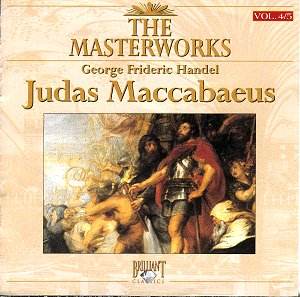Along with the 'Occasional Oratorio', which preceded
it, 'Judas Maccabeus' marks a significant departure for Handel.
His previous dramatic oratorio, 'Belshazzar' (written to a fine
libretto by Charles Jennens) had been well received by the cognoscenti,
but had played to poor houses. This had been followed, on Handel's
part, by severe illness. His contribution to the war effort, as
a result of the 1745 rebellion, had been the 'Occasional Oratorio',
probably to a libretto by Thomas Morrell. This was a hastily assembled
affair, reusing large chunks of earlier works, but it chimed in
with the national mood. 'Judas Maccabeus' was more considered,
but again it eschewed the fine wrought dramatic oratorio style
of 'Belshazzar' for a more broad, brush approach with far less
intrinsic drama.
The libretto was written by Reverend Thomas Morrell.
Rector of Buckland in Herts and a perpetual curate of Kew, Morrell
was in the circle that surrounded Queen Caroline and was a friend
of Garrick and Hogarth. As a librettist, Morrell was more relaxed,
easy going and compliant than his predecessor Charles Jennens
(author of the libretti to 'Messiah' and 'Belshazzar'). Handel
had easier relations with Morrell than with Jennens. Though Morrell
later recalled the difficulty of supplying an oratorio text 'especially
if it be considered, what alterations he must submit to, if the
composer be of an haughty disposition and has but an imperfect
acquaintance with the English Language'.
'Judas Maccabaeus' was first performed on 1st
April 1747. The title role was sung by the distinguished tenor,
John Beard. The soprano soloist was Elisabetta de Gambarini herself
a composer, to whose collection of keyboard lessons and songs
Handel subscribed. It was probably originally conceived of before
the 'Occasional Oratorio' but then shelved in favour of that oratorio.
When the project was revived, its mood of triumph and popular
rejoicing was made to fit the national mood in the wake of the
victorious outcome of Cumberland's Scottish Campaign in 1746.
This is the least dramatic of Handel's narrative
oratorios, the military actions are all reported by messengers.
Judas Maccabaeus was the son of an aged priest who took to the
mountains in rebellion when Antiochus IV Ephiphanes tried to impose
the Greek religion on the Jews, Judas became leader of the rebels
on his father's death and won a series of victories over the Syrians
in 166–164 BC. In 166 he purified the Temple of Jerusalem, an
event celebrated at Hanukkah. On Antiochus's death in 164, the
Seleucids offered the Jews freedom of worship, but Judas continued
the war, hoping to gain political freedom. He was killed soon
thereafter, but his brothers carried on the struggle. The history
of the dynasty is told in the two books of Maccabees in the Apocrypha.
There is a significant absence of personal relationships
in Handel's oratorio and this is enhanced by the abstract nature
of the female roles. They are mainly disembodied voices rather
than particular characters. The oratorio proved popular and was
revived nearly every succeeding season until Handel's death.
Generally, you can tell from the first notes
of the overture whether a Handel performance is going to be to
your taste. Here, the English Chamber Orchestra make an unfashionable
rich sound, but they are crisp, rhythmic and not a little stylish.
The recording dates from 1972 and the English Chamber Orchestra's
Handel was considered very stylish at the time. Somary's speeds
are a little on the steady side but not overly so and the performance
of the overture never becomes ponderous. Unfortunately things
take a turn for the worst when the chorus come on. They make a
huge, vibrato laden sound. Not only is it completely at odds with
current views on Handelian choral sound, it is also at odds with
the sound made by the English Chamber Orchestra. At this point,
you might wonder whether it was worth persevering with the recording.
But then along comes Helen Watts. She sings with such admirable
style and flexibility that you want to continue listening. Her
duet with Heather Harper in 'Come ever smiling liberty' is a joy
and made you long for more.. Heather Harper is a stylish soprano
soloist and her contributions, such as 'Ah! Wretched Israel' are
exquisite. Harper's lovely singing is one of the things that made
listening to this recording worth while, when faced with the choral
sounds made by the Amor Artis Chorale. And even they have their
moments, when called to be robustly martial, then they are roused
to firmer tones.
John Shirley-Quirk makes a fine bravura effort
of his first aria 'Arm, arm, ye brave!'. Quirk's familiar tones
lend warmth to Simon's heroic platitudes. Alexander Young has
a bright, steely tone, suitable for Judas. He is suitably heroic
(Judas is not one of the subtlest of Handelian roles) but he seemed
a little bogged down by the passage work. By 1972 he would have
been moving towards the end of his career. (By the time I saw
him in Gerontius in 1973 I think that he was spending most of
his time teaching).
The performance is marred by a number of cuts,
the most damaging is the Liberty sequence in Act I (though we
do get 'Come Ever Smiling Liberty' itself). I am a little curious
as to why this particular performance was revived as there exists
a similar Mackerras recording from 1977 which is altogether more
stylish and intelligent. The recording is blessed with four very
stylish British Handelians and is worth listening to for them,
if nothing else.
Robert Hugill
